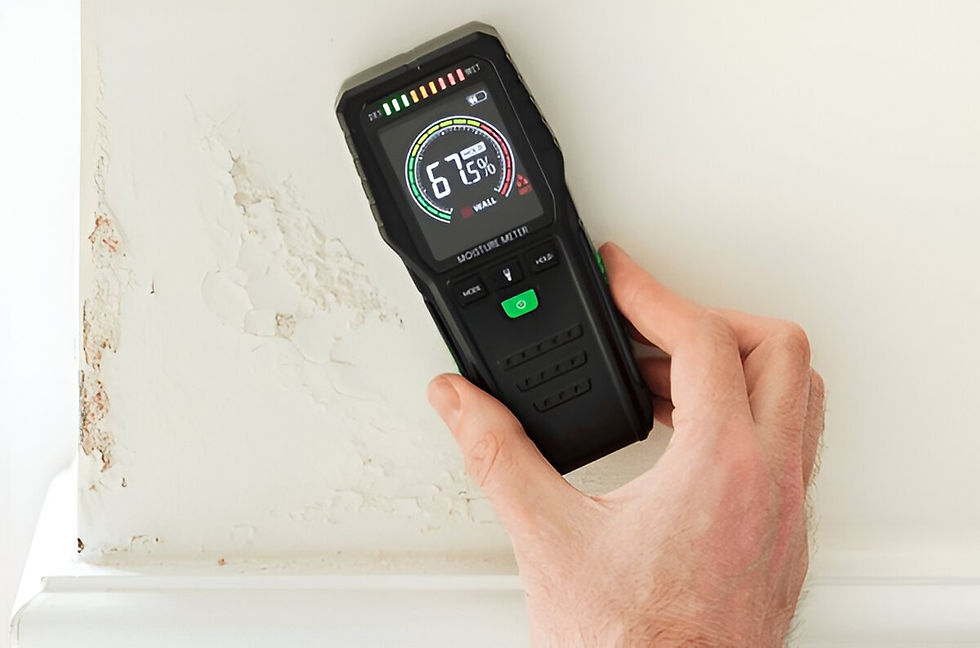Why Regular Moisture Inspections Are Essential for Long-Term Property Protection
- mariotovaropo
- Apr 3
- 4 min read

Moisture is one of the most significant threats to property integrity, leading to a myriad of issues that can compromise both safety and value. Regular moisture inspections are a crucial aspect of property management that helps mitigate risks associated with water damage. These inspections not only identify existing problems but also prevent potential issues from developing, ensuring the longevity and safety of the property.
In this article, we will delve into the importance of moisture inspections, the various types of inspections available, proactive measures to take, and the long-term benefits of regular assessments. By understanding the critical role these inspections play, property owners can make informed decisions to protect their investments.
Understanding Moisture Inspections
What Are Moisture Inspections?
Moisture inspections involve a thorough examination of a property to identify areas susceptible to water intrusion or dampness. Trained professionals utilize specialized tools to detect moisture levels in walls, ceilings, and other structural components. The goal is to uncover hidden leaks, condensation issues, or other water-related problems that could lead to significant damage if left unchecked.
The Importance of Regular Inspections
Regular moisture inspections serve as a preventive measure against water damage. They help in:
Identifying Hidden Issues: Many moisture problems are not visible to the naked eye. Inspections can uncover hidden leaks or damp spots that may lead to mold growth or structural damage.
Maintaining Property Value: Properties that are well-maintained retain their value better than those that suffer from neglect. Regular inspections can prevent costly repairs down the line.
Enhancing Safety: Excess moisture can lead to hazardous conditions, such as mold growth, which poses health risks. Regular assessments help mitigate these dangers.
Common Causes of Moisture Problems
Environmental Factors
Various environmental factors can contribute to moisture issues in properties, including:
Heavy Rainfall: Excessive rain can overwhelm drainage systems, leading to water accumulation around the foundation.
Humidity: High humidity levels can lead to condensation on surfaces, promoting mold growth.
Flooding: Natural disasters can cause significant water intrusion, requiring immediate attention.
Structural Issues
Certain structural problems can also lead to moisture accumulation:
Poor Drainage: Inadequate drainage systems can cause water to pool around the property.
Roof Leaks: Damaged roofing materials can allow water to seep into the building.
Cracks in Walls or Foundations: These can serve as entry points for moisture, leading to further complications.
The Process of Moisture Inspections
Initial Assessment
The first step in a moisture inspection is a visual assessment of the property. Inspectors look for signs of water damage, such as stains, discoloration, or mold growth. This initial evaluation helps identify areas that require further investigation.
Utilizing Technology
Modern moisture inspections often involve advanced technology to detect hidden moisture. Common tools include:
Moisture Meters: These devices measure moisture levels in different materials, allowing inspectors to pinpoint problem areas.
Thermal Imaging Cameras: These cameras can detect temperature variations in walls and ceilings, indicating moisture presence.
Drones: For larger properties, drones can provide aerial views to identify potential drainage issues or roof leaks.
Comprehensive Reporting
After completing the inspection, professionals typically provide a detailed report outlining their findings. This report may include:
Identified Problem Areas: Specific locations where moisture issues were detected.
Recommendations for Remediation: Suggested actions to address the identified problems.
Follow-Up Actions: Guidance on when to schedule the next inspection.
Benefits of Regular Moisture Inspections
Prevention of Major Repairs
One of the most significant advantages of regular moisture inspections is the prevention of expensive repairs. By identifying issues early on, property owners can address them before they escalate into more significant problems, saving time and money.
Improved Indoor Air Quality
Excess moisture can lead to mold growth, which can negatively impact indoor air quality. Regular inspections help ensure that any mold issues are addressed promptly, contributing to a healthier living environment.
Enhanced Energy Efficiency
Moisture problems can lead to increased energy costs due to inefficient heating and cooling systems. By maintaining optimal moisture levels, property owners can improve energy efficiency and reduce utility bills.
Proactive Measures to Prevent Moisture Issues
Proper Ventilation
Ensuring adequate ventilation in areas prone to moisture, such as bathrooms and kitchens, is essential. This can be achieved by:
Installing exhaust fans to remove excess humidity.
Opening windows to promote airflow.
Regular Maintenance
Routine maintenance can help prevent moisture-related issues, including:
Inspecting and cleaning gutters to ensure proper drainage.
Checking for cracks in foundations and sealing them promptly.
Regularly examining roofing materials for wear and tear.
The Role of Professional Services
When to Hire a Professional
While property owners can perform basic inspections, hiring a professional for thorough moisture evaluations is often advisable. Professionals have the expertise and tools necessary to conduct comprehensive assessments and provide accurate recommendations.
Choosing the Right Service
When selecting a moisture inspection service, consider the following factors:
Experience and Qualifications: Look for companies with a proven track record in moisture inspections.
Technology Utilized: Ensure they use modern tools and techniques for accurate assessments.
Customer Reviews: Check online reviews and testimonials to gauge the quality of their services.
Conclusion
Regular moisture inspections are essential for the long-term protection of properties. By identifying potential issues early, property owners can prevent costly repairs, improve indoor air quality, and enhance energy efficiency. Taking proactive measures, such as ensuring proper ventilation and conducting routine maintenance, further contributes to a moisture-free environment.
Investing in professional moisture inspection services not only safeguards your property but also provides peace of mind knowing that you are protecting your investment for years to come. Prioritizing moisture inspections is a smart strategy for any property owner looking to maintain the integrity and value of their property.
For more information about Moisture Inspections in New Brunswick New Jersey please contact:
Business Name: New Jersey Mold Specialist
Address: 92 Bayard St # 203, New Brunswick, NJ 08901, United States
Phone: (732) 973-9352
Website: https://njmoldspecialist.com/





Comments